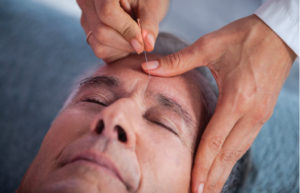By Maria Hidalgo-Thielen
 Unfortunately, we all know someone that has been diagnosed or has a family member with Alzheimer’s Disease (AD). More than
Unfortunately, we all know someone that has been diagnosed or has a family member with Alzheimer’s Disease (AD). More than
30 million Americans suffer from some type of dementia. It is estimated a total cost of $290 billion dollars will go towards healthcare for AD and other dementias in the year of 2019. It is the sixth leading cause of death in the United States (https://www.advisory.com/daily-briefing/2019/01/16/deaths) and like other common chronic diseases; we know it develops as a result of multiple factors rather than a single cause. Fortunately, Alzheimer’s disease is not a normal part of aging. Lifestyle modifications, acupuncture and functional medicine are proving to be an effective way to treat AD and other neurodegenerative diseases.
Acupuncture is a part of the whole medical system in Asian countries, having a history of over 2,500 years of effectively treating illness. The World Health Organization (WHO) has published guidance on the efficacy of acupuncture in the cure or relief of 64 different clinical conditions, such as dementia, stroke rehabilitation, parkinsonism, depression, chronic pain, headache, hemiplegia, nausea and vomiting, among others (WHO. Acupuncture: Review and Analysis of Reports on Controlled Clinical Trials. Geneva, Switzerland: World Health Organization Press; 2003). Promising findings about the effects of acupuncture/EA on stem cell mobilization and on progenitor cell proliferation in the central nervous system (CNS) is just one of the ways acupuncture has shown to have beneficial effects in several neurodegenerative diseases and has been proven to be a nondrug method for mobilizing stem cells in the CNS (https://www.ncbi.nlm.nih.gov/pmc/articles/PMC5530374/)
Amyloid Precursor Protein (APP) is an integral membrane protein in many tissues and concentrated in the synapses of neurons. According to Alzheimer’s Association: “Scientists don’t yet know APP’s function, but they’ve learned that day-to-day brain activity involves continuous “processing” of APP into shorter pieces. One of the brain’s APP processing pathways produces beta-amyloid, a fragment that’s the chief component of plaques and a prime suspect in Alzheimer’s-related brain changes.” What if Amyloid-beta buildup is a symptom of an underlying problem in the body that is triggering the chain of biological events and symptoms leading to Alzheimer’s and other neurodegenerative conditions?
Conventional medicine is focusing on removing Amyloid-beta plaque buildup in the brain by using a bottom-level approach. Amyloid-beta is not the main problem. The Amyloid-beta build up is a symptom of an underlying problem in the body. It’s the body’s response to several factors impeding the health of an individual. Functional medicine offers a top-level approach where it addresses the underlying causes of the disease by addressing factors that include nutrient deficiencies, inflammation, toxin build up and overload on the system, pathogens, oxidative stress and/or atrophy. A course of treatment is to discover the root cause of the problem, remove or reduce the insults and improve health with lifestyle modifications, acupuncture and functional medicine.
There have been breakthroughs in early detection of Alzheimer’s via blood test. It may be able to detect Alzheimer’s 10 years before onset with 100% accuracy. The biomarker that is focused on is a protein in the brain called IRS-1 (Insulin Receptor Substrate). The National Institute on Aging conducted a study to show the efficacy of this blood test where they collected blood samples from 174 participants, 70 having Alzheimer’s, 20 having diabetes and 84 were healthy (https://www.fasebj.org/doi/abs/10.1096/fj.14-262048).
After discovering these biomarkers what does an individual do? Where does a person go from there? How can someone take care of their brain in a way that prevents neurodegeneration from setting in? This is the challenge that people are faced with and may not know where to turn to find accurate information on treatment options.
An individual can begin their journey by getting comprehensive blood tests administered by a functional medicine practitioner. Some examples of the blood tests are: to determined if there is a toxic overload in the system by testing heavy metals, pesticides, chemical exposure and antimicrobials; to determine if there is insulin resistance which can cause inflammation in the brain; to determine if there are pathogens present; to determine if a hormone imbalance exist and if the thyroid is functioning properly.
After the blood tests are complete, a treatment protocol is created to address each issue to optimize health and achieve the greatest possible outcome. Each individual will have their unique treatment regimen.
For more information on treatment options please schedule a free consultation with the clinic at 561-533-7475 or visit the website at www.palmbeachacu.com
Chaas Gantt L. AP is board certified by The National Certification Commission for Acupuncture and Oriental Medicine (NCCAOM®), Functional Medicine Practitioner, Board Certified Herbalist, Injection Therapy Certified and State Licensed. He has learned and apprenticed under renowned physicians and master acupuncturists in the United States, Europe and Asia.
Palm Beach Acupuncture (PBA) is a family-run acupuncture and integrative medical clinic in Lake Worth, Florida. Their mission is to partner with you on your way to enhance, regain and maintain optimum health and vitality. By utilizing a functional medicine approach and combining Japanese and Chinese acupuncture techniques, cupping therapy, moxibustion, clinical nutrition and herbal medicine, PBA’s aim is to provide a road map to successful outcomes that complement the diagnosis and care of standard medicine.
At PBA they strongly believe in the innate wisdom of the body. Your body knows how to heal itself; sometimes it just needs a little support and guidance. PBA accepts most major insurance carriers.
Check Also
The Mighty Maestro: Bob “Mighty Mite” Toski’s Enduring Legacy at 98
In the warm glow of a spring evening in Delray Beach, Florida, a remarkable celebration …
 South Florida Health and Wellness Magazine Health and Wellness Articles
South Florida Health and Wellness Magazine Health and Wellness Articles




